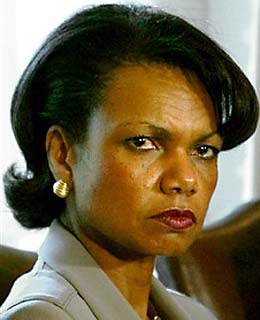
As George W. Bush's National Security Adviser, Condoleezza Rice spends more time with the President than anyone else in the West Wing. But her clout is more the product of experience than ideology. In the early days of Bush's term, she tutored the President and quietly helped set his priorities. More recently, she has taken the lead on several make-or-break challenges, from reviving the moribund Arab-Israeli peace plan to overseeing arrangements for handing over power in Iraq. Though others may call the shots, Rice's proximity to power has made her the foreign-policy voice of the White House.
Her quick ascendancy surprised no one who knew her well. She served in George H.W. Bush's Administration as an expert on the Soviets and arms control, earning the admiration of Bush 41 and Brent Scowcroft. She was Stanford's provost during the Clinton years and quietly worked her way into George W. Bush's inner circle in the late 1990s. She has had trouble since then bridging the deep divide between the Bush team's hard-liners and moderates, but if she has challenged Dick Cheney or Donald Rumsfeld in intramural arguments, she has been careful not to allow those differences to become public. Her recent appearance before the 9/11 commission received mostly positive reviews, partly because she so deftly sidestepped criticism of her own mistakes. She will have her pick of Cabinet posts in a second Bush term; she can go to either State or Defense if either Colin Powell or Rumsfeld departs. How Bush will manage without her in the White House is another question.
From the Archive
Condi Rice Can't Lose: George W. Bush's foreign-policy adviser is a future superstar. But can she save Bush from Himself?